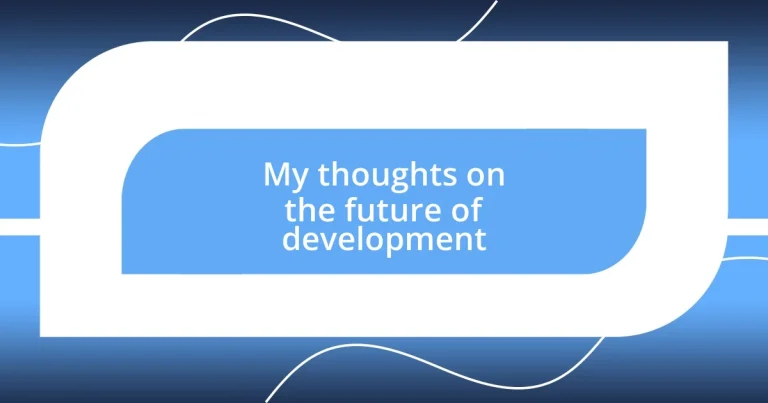Key takeaways:
- The integration of artificial intelligence (AI) is revolutionizing development, enhancing decision-making and predictive analytics.
- Sustainability is an essential focus in development, offering both environmental benefits and economic advantages, while fostering community engagement.
- Adaptability, emotional intelligence, and digital literacy are critical skills for success in future development, enabling better collaboration and responsiveness to change.
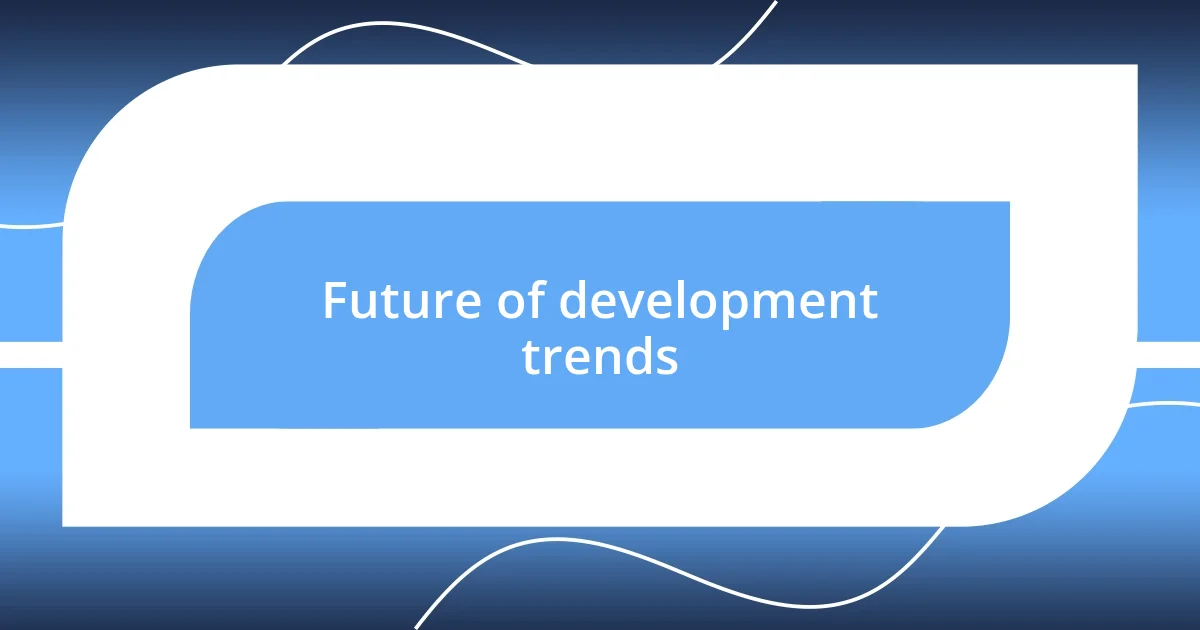
Future of development trends
As I reflect on the future of development trends, I can’t help but feel excited about the role of artificial intelligence (AI). It’s not just about automating tasks anymore; I believe AI will elevate our decision-making processes. Have you considered how machine learning can transform everything from predictive analytics in business to personalizing user experiences? I have seen firsthand the profound impact it can make.
Another fascinating trend seems to be the increasing emphasis on sustainability in development practices. Whenever I walk through cities transforming their old infrastructures into greener spaces, I feel a sense of optimism. How can we not cherish a future where our projects not only serve people but also honor our planet? This focus on eco-friendly design and renewable technologies will certainly shape the coming decade.
Lastly, I’ve noticed a significant shift towards remote collaboration tools among developers, particularly since the pandemic. Personally, I’ve embraced virtual reality meetings and online platforms that make teamwork seamless, despite physical distances. Isn’t it incredible how this technology shapes our interactions and fosters creativity? The future of development is increasingly about connection, no matter where we are in the world.
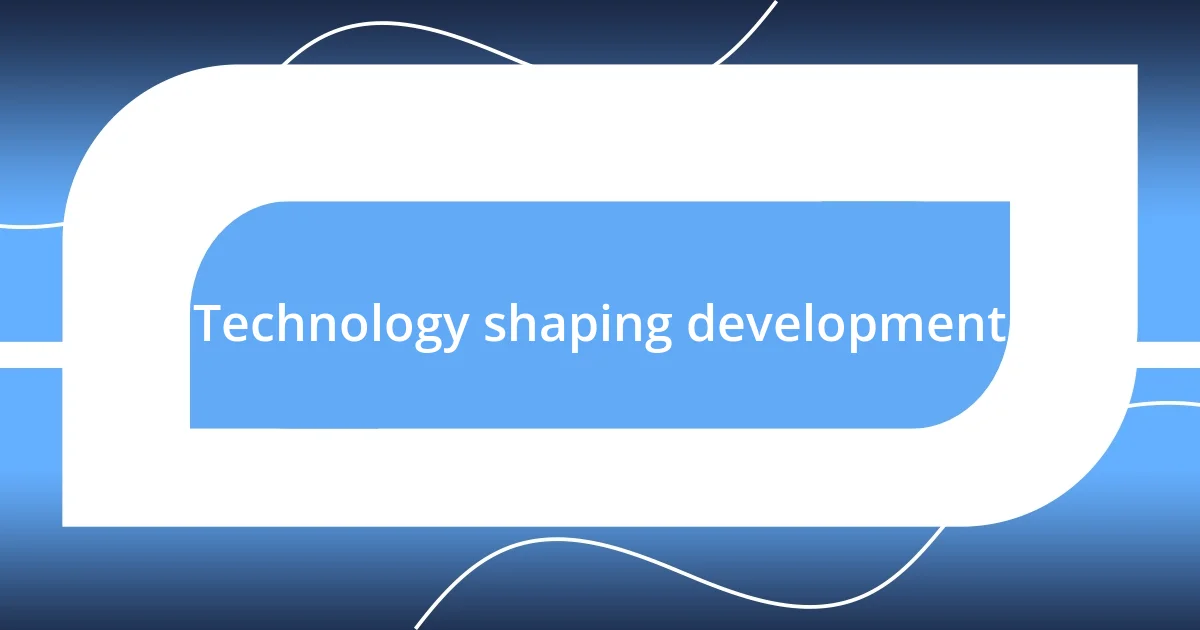
Technology shaping development
Technology is undeniably a driving force in shaping development. I often think about how innovations like blockchain are revolutionizing industries by enhancing transparency and security. It’s amazing to witness the shift toward decentralized systems; it really makes me optimistic about a more equitable future.
- Enhanced Data Access: With tools that allow instant access to vast amounts of data, decision-making is more informed than ever.
- Collaboration Across Borders: Technologies enable teams from different continents to work together in real time, fostering global partnerships.
- Smart Urban Development: The rise of IoT (Internet of Things) enables cities to become smarter and more efficient, improving quality of life for residents.
- User-Centric Design: Advances in technology allow for designs that are increasingly tailored to user needs, making products and services more relevant and effective.
With each advancement, I find myself reflecting back on when I started my career. Back then, manual processes dominated, making it tough to keep pace with fast-changing markets. But now, as organizations leverage technologies like cloud computing, the sky is truly the limit for what we can achieve.
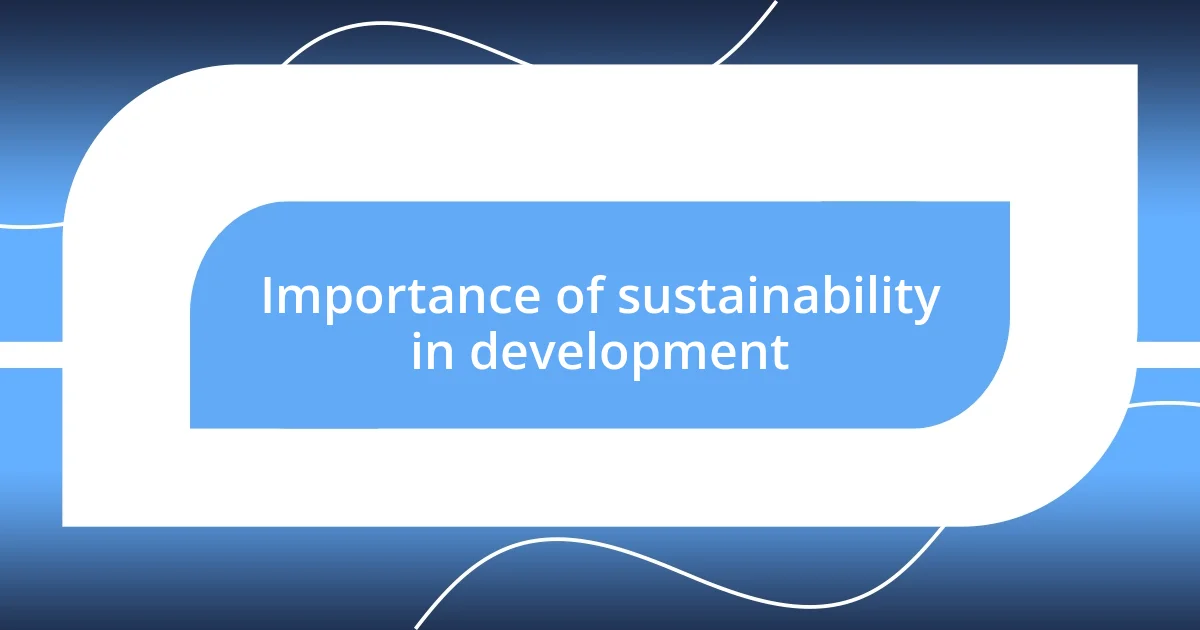
Importance of sustainability in development
Sustainability in development isn’t just a trend; it’s a necessity for our future. Throughout my career, I’ve seen projects that prioritize eco-friendly materials and practices make a tangible difference. For instance, a recent green building initiative in my city not only reduced carbon emissions but also enhanced the well-being of residents. Is there anything more gratifying than knowing development can benefit both people and the planet?
Furthermore, embracing sustainable practices leads to economic advantages as well. When businesses incorporate renewable energy or resource-efficient designs, they often uncover cost savings and increased marketability. I once worked with a startup that shifted to sustainable sourcing, and they saw a spike in customer loyalty. Why? Because consumers are increasingly willing to support brands that care about their impact on the world. Isn’t that a compelling reason to prioritize sustainability?
Finally, there’s an emotional aspect to sustainability that I find deeply compelling. Projects that honor our environment create a sense of community and purpose. I remember attending a community clean-up event linked to a new urban park project; it was heartwarming to see neighbors come together, fostering lasting connections. How often do we get that sense of belonging from development? The focus on sustainability nurtures not just our landscapes but our people as well.
| Aspect | Traditional Development | Sustainable Development |
|---|---|---|
| Environmental Impact | Often detrimental | Minimizes harm to ecosystems |
| Economic Benefits | Short-term focus | Long-term savings & profitability |
| Community Engagement | Limited involvement | Promotes unity and active participation |
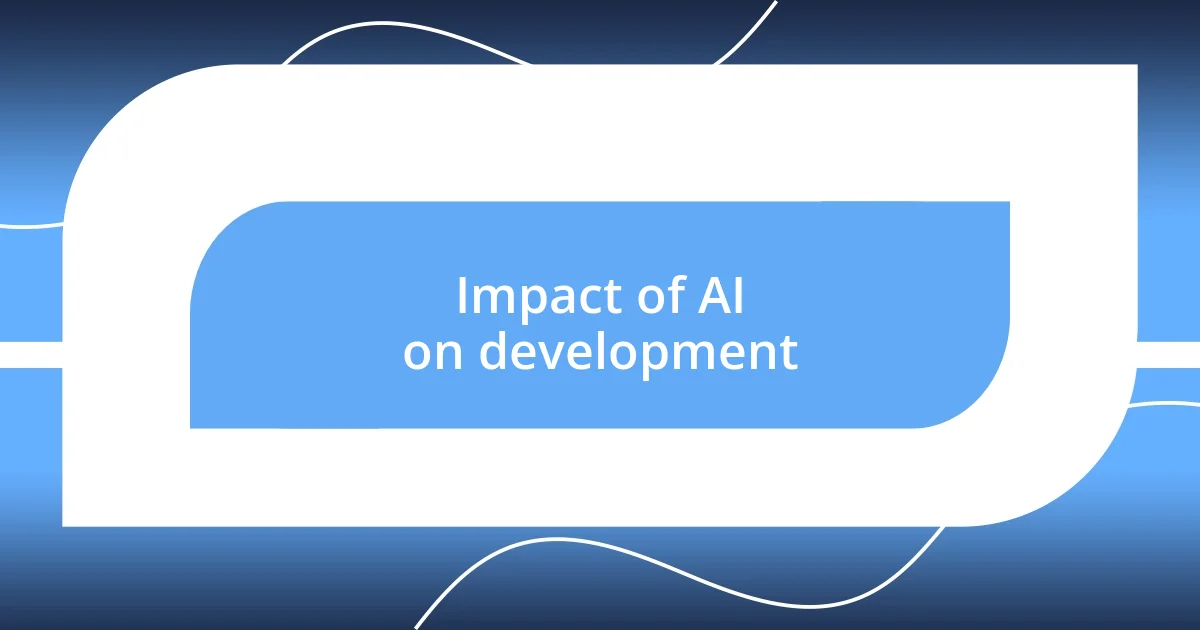
Impact of AI on development
The impact of AI on development is both profound and multifaceted. I remember the first time I saw AI tools streamline a project I was working on; it was nothing short of a revelation. The ability to analyze data and predict trends with such precision made me wonder—how did we ever manage before? AI isn’t just a tool; it’s becoming an essential partner in decision-making processes.
One exciting aspect of AI is its capacity to enhance predictive analytics. This means that organizations can foresee potential challenges and opportunities before they arise. For example, during a recent project, our team implemented an AI model that anticipated user behavior, which allowed us to pivot our strategy effectively. It felt like having a crystal ball! Isn’t it exhilarating to think about the degree to which AI can shape our development initiatives?
Moreover, AI-driven technologies can drive inclusivity in ways we haven’t even begun to fully explore. I often reflect on how language barriers once limited my outreach in international projects. Now, with AI-powered translation tools, I can connect with diverse teams seamlessly. This shift not only fosters collaboration but also enriches the development landscape by bringing in varied perspectives. Aren’t these advancements a testament to the transformative power of technology?
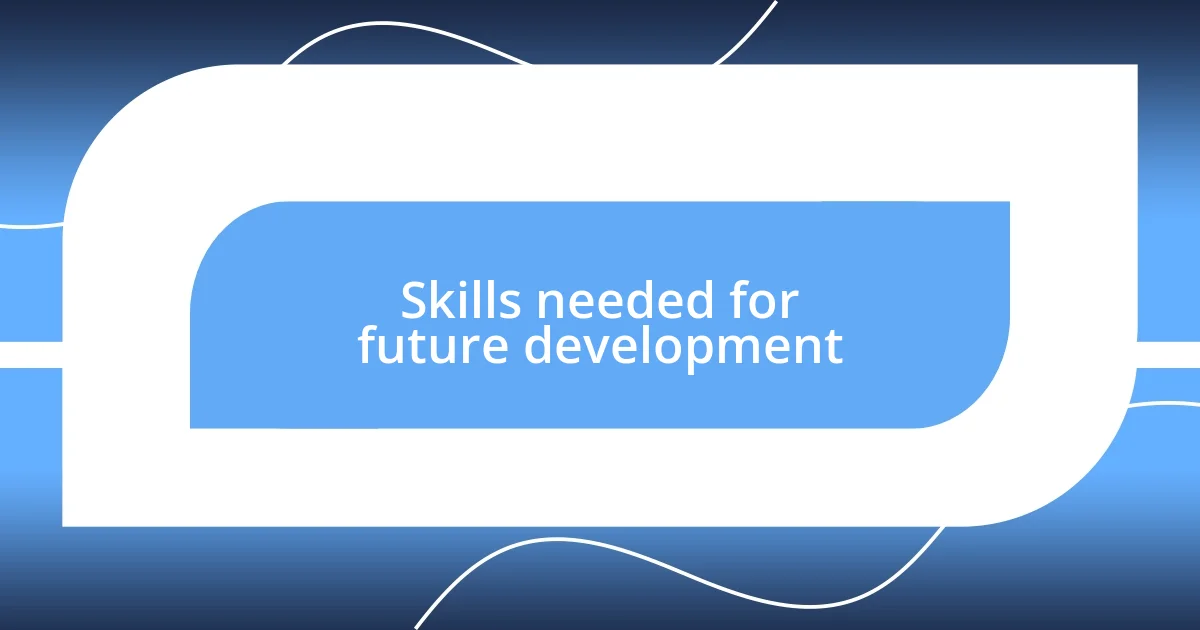
Skills needed for future development
To thrive in the future of development, adaptability stands out as a crucial skill. I’ve observed that the ability to pivot in response to new information or changing circumstances can make or break a project. For example, during a digital transformation initiative, our team had to shift gears when unexpected regulatory changes arose. That experience taught me how vital it is to embrace flexibility rather than resist it. Isn’t it fascinating how adaptability can lead to innovation?
Another important skill is emotional intelligence, which can profoundly influence team dynamics and stakeholder interactions. I remember leading a project where tensions ran high due to tight deadlines. By taking the time to listen and empathize with my team’s concerns, I saw a positive shift in morale and productivity. Emotional intelligence fosters collaboration and understanding—qualities essential for navigating the complexities of development work. Have you ever wondered how much smoother projects could run if we all prioritized emotional connections?
Moreover, digital literacy is becoming indispensable as technology continues to shape our world. I’ve been particularly impressed by colleagues who seamlessly adapt to new software or platforms, making them invaluable team members. In a recent project, my proficiency with data visualization tools helped the entire team understand our findings more clearly. It made me realize that while having technical skills is essential, being open to learning about emerging technologies keeps us relevant and ahead of the curve. Don’t you think staying sharp and informed is the best way to prepare for the future?
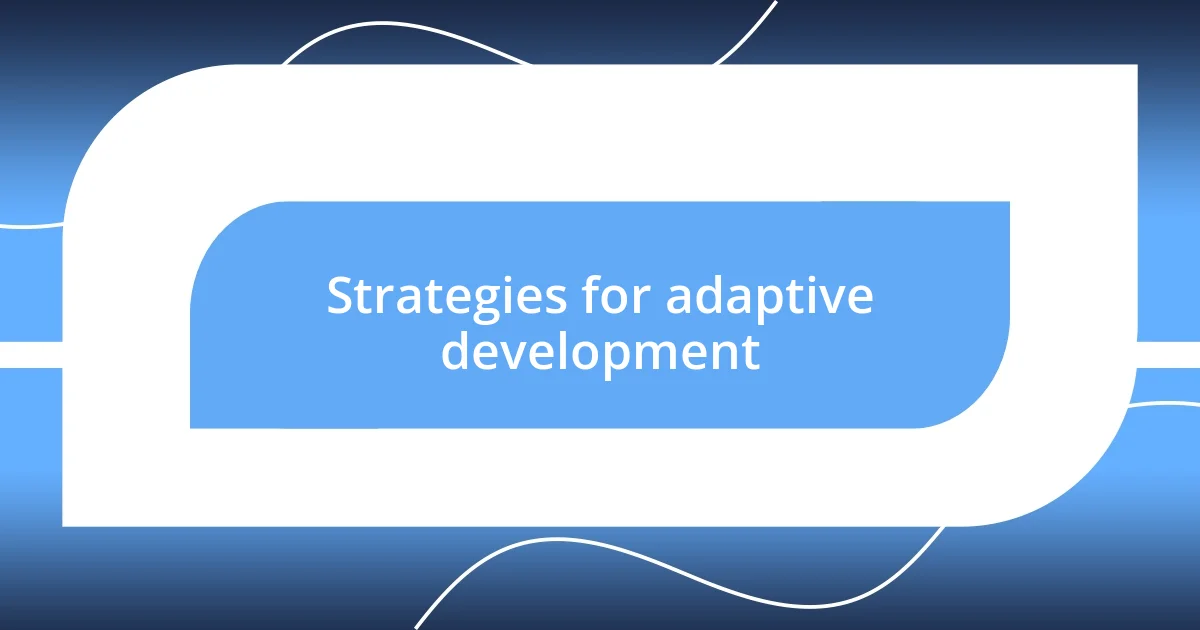
Strategies for adaptive development
Adaptive development requires a proactive approach in anticipating and responding to changes. I recall a time when our project faced unexpected market shifts. Instead of pressing ahead with our initial plan, we gathered the team for a brainstorming session. That open dialogue not only surfaced innovative ideas but also fostered a sense of ownership among everyone involved. It really impressed upon me how embracing adaptability can transform obstacles into opportunities. Have you ever experienced a setback that turned out to be a blessing in disguise?
Flexibility in strategy is equally important. I vividly remember a project where we had to alter our course midway due to new regulatory requirements. It felt daunting initially, but our willingness to embrace change led us to discover more efficient processes. This adaptability not only saved the project but also enriched the collaborative spirit within the team. Isn’t it fascinating how changing directions can often lead to better outcomes than we ever anticipated?
Lastly, continuous learning plays a pivotal role in adaptive development. I’ve found myself diving into online courses and webinars to keep up with the rapid pace of change in my field. During this personal growth journey, I’ve come across valuable insights on emerging technologies and innovative methodologies that truly enhanced my professional toolkit. By committing to lifelong learning, I feel more equipped to navigate the unpredictable landscapes of development. How often do you take time to invest in your learning for future challenges?











